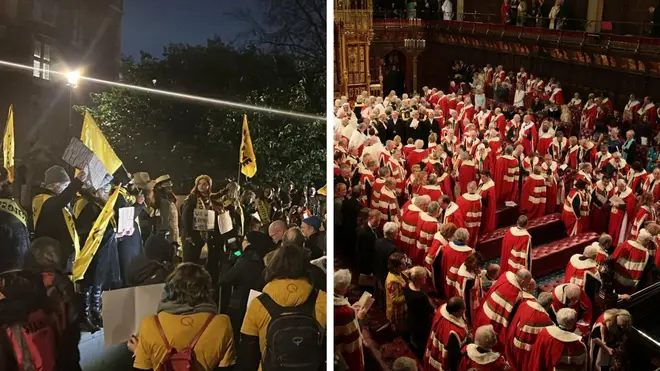
Ben Kentish 7am - 10am
18 January 2022, 06:50 | Updated: 18 January 2022, 07:34

The Government's controversial plans to crack down on disruptive protests have suffered a series of defeats in the House of Lords.
The wide-ranging Police, Crime, Sentencing and Courts Bill was set to introduce changes that put protesters at risk of lengthy prison sentences and large fines for actions that cause "serious annoyance", some being as simple as making too much noise.
New powers turned down by the chamber included allowing police officers to stop and search anyone at a protest "without suspicion" for items used to prevent a person being moved, known as "locking-on".
A move that would allow individuals with a history of causing serious disruption to be banned from attending certain protests was also dismissed, along with a proposal to make it an offence for a person to disrupt the operation of key national infrastructure, such as airports and newspaper printers.
In a separate defeat, peers backed restricting the imposition of tougher sentences for blocking a highway to major routes and motorways rather than all roads.
It comes as eco protesters have caused travel chaos on the roads in recent months, blockading the M25 and glueing themselves to the ground in a bid to get the Government's attention over the climate crisis.
Earlier on Monday, the Lords also defeated other proposed curbs on demonstrations, including powers to impose conditions on protests judged to be too noisy.
Read more: Drivers could be charged per mile in London under Khan's new climate crackdown
Read more: Partygate scandal: No10 denies Dominic Cummings' claims PM lied to Parliament

Clashes at London 'Kill the Bill' protest
Following the vote, the amended bill is set to return to the Commons for further debate, as part of a Parliamentary back-and-forth known as ping-pong.
Peers were strongly critical after measures had been introduced at such a late stage of the passage of the Bill, after it had already gone through the elected House.
Labour frontbencher Lord Rosser pointed out the "sweeping, significant and further controversial powers" had not been considered by the Commons and branded it an "outrageous way to legislate".
He said: "We cannot support any of these last-minute, rushed and ill-thought-through broad powers... with the exception of approving the increased sentences for wilfully obstructing motorways and major roads."
However, Home Office minister Baroness Williams of Trafford stressed the need for the measures and argued they were "vitally important in protecting the country from the highly disruptive tactics employed by a small number of people".
She added: "The rights to freedom of speech and assembly are a cornerstone of our democracy and this Government will not shrink from defending them.
"But a responsible Government, one that stands up for the rule of law, must also defend the rights and freedom of the law-abiding majority.
"Their rights cannot and must not be trampled on by a small minority of protesters, who believe they should not be answerable to the law and should be given carte blanche to cause any amount of disruption at any cost."

Keir Starmer says why Labour didn’t support the Police, Crime, Sentencing and Courts Bill
Meanwhile, Kill the Bill protesters appeared outside Parliament while the bill was being debated.
Hundreds gathered at College Green, opposite the House of Lords, and could be heard drumming from inside the chamber.
Some held signs saying "Is this the last legal protest?" and "All protests will soon be illegal" while others held flags.